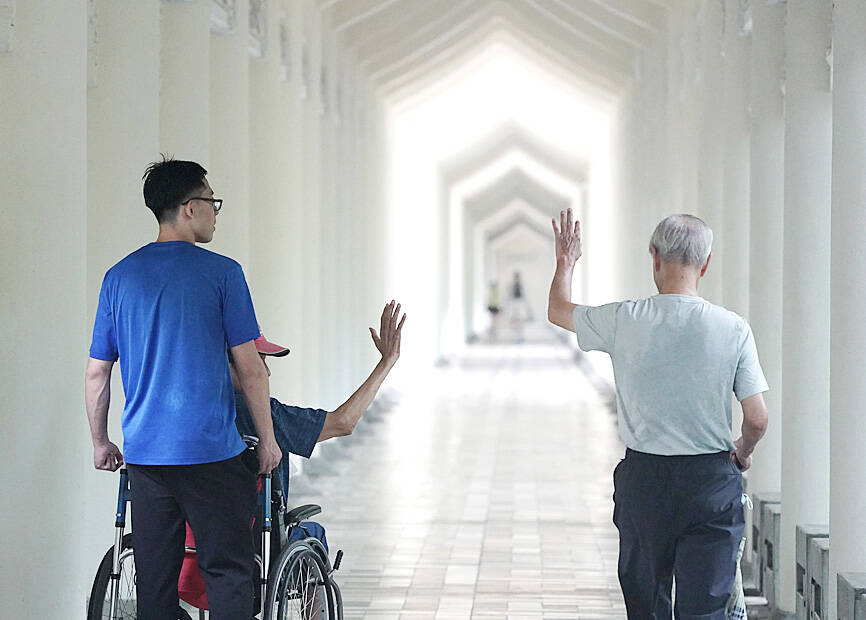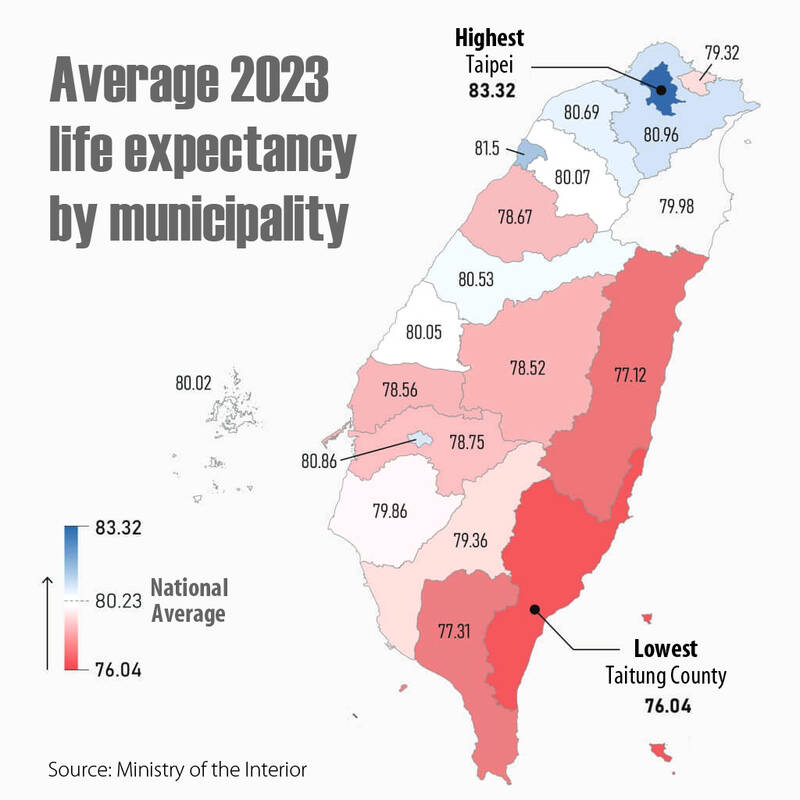The average life expectancy in Taiwan last year was 80.2 years, a 0.4-year increase from 2022, Ministry of the Interior data showed yesterday.
The figure for men was 76.9 years and 83.7 for women, up 0.3 years and 0.5 years respectively from the year before, the ministry said in the 11th edition of the annual mortality report.
Life expectancy for men in Taiwan was seven years higher than the global average and it was nine years higher for women, it said.

Photo: CNA
Residents of northern Taiwan tend to live longer than those in the south, with Taipei residents having an average life expectancy of 83.8 years, the highest in the nation, the report said.
The other five special municipalities had life expectancies in descending order of New Taipei City, Taoyuan, Taichung, Tainan and Kaohsiung, it said.
Hsinchu City residents had the highest life expectancy of areas outside the special municipalities at 81.5 years, while Taitung County residents had the lowest at 76 years, it said.

The figures for Taitung and Hualien counties were 4.2 years and 3.1 years below the national average, although the gap closed by 1.2 years and 0.4 years respectively from the year before.
The report was released a day after President William Lai (賴清德) said that the government would work to increase the average lifespan of people living in Taiwan to 82 years over eight years.
“Over the next eight years, we aim to increase the average life expectancy of our citizens to 82 years from 79” and make more of those years healthy, Presidential Office spokesman Xavier Chang (張惇涵) quoted Lai as saying.
Chang was addressing a news conference a day after the first meeting of the Healthy Taiwan Promotion Committee, one of three ad hoc groups established by the Presidential Office.
“At the same time, the child mortality rate should be lowered from 5.3 per 1,000 to below 4 per 1,000,” Chang quoted Lai as saying.
Lai underscored the importance of improving the long-term care system and implementing measures to prevent chronic diseases, enhance screening, and improve the health of children and indigenous people, Chang said.
Few other details were offered.
The mortality rate for children under five was 5.1 per 1,000 in 2022, Ministry of Health and Welfare data showed, lower than the Organisation for Economic Co-operation and Development average, which was 6 per 1,000 in 2022.
However, Taiwan has not performed as well as South Korea and Japan. In 2022, the child mortality rate was about 3 per 1,000 in South Korea and 2 per 1,000 in Japan.
The Executive Yuan last month pledged to allocate about NT$13.5 billion (US$422.19 million) for an updated medical care program targeting pregnant women, newborns and children from fiscal 2025 to 2028, nearly five times the allocation for the current four-year program.
On Thursday, the 35-member health committee also touched on the National Health Insurance (NHI) system, with Lai pledging to continue reforming the system.
Chang said that while the president was open to ideas of how to make the NHI system more financially sustainable, he emphasized the need to keep it accessible to everyone.
Meanwhile, Shih Chung-liang (石崇良), head of the National Health Insurance Administration, said that due to Taiwan’s low birthrate and aging population, insurance revenue collected last year covered only about 75 percent of NHI expenditure.
To bridge the gap, the remaining costs were primarily covered by tax revenue, including tobacco taxes, along with additional financial support, Shih said.
He was referring to NT$24 billion that was put into the system from the government’s general budget last year.
While several potential measures to alleviate the financial strain on the NHI system were proposed, such as collaborations with private insurance companies or increasing NHI premiums, no conclusion was reached during the four-hour meeting, Chang said.

AGING: As of last month, people aged 65 or older accounted for 20.06 percent of the total population and the number of couples who got married fell by 18,685 from 2024 Taiwan has surpassed South Korea as the country least willing to have children, with an annual crude birthrate of 4.62 per 1,000 people, Ministry of the Interior data showed yesterday. The nation was previously ranked the second-lowest country in terms of total fertility rate, or the average number of children a woman has in her lifetime. However, South Korea’s fertility rate began to recover from 2023, with total fertility rate rising from 0.72 and estimated to reach 0.82 to 0.85 by last year, and the crude birthrate projected at 6.7 per 1,000 people. Japan’s crude birthrate was projected to fall below six,

US President Donald Trump in an interview with the New York Times published on Thursday said that “it’s up to” Chinese President Xi Jinping (習近平) what China does on Taiwan, but that he would be “very unhappy” with a change in the “status quo.” “He [Xi] considers it to be a part of China, and that’s up to him what he’s going to be doing, but I’ve expressed to him that I would be very unhappy if he did that, and I don’t think he’ll do that. I hope he doesn’t do that,” Trump said. Trump made the comments in the context

SELF-DEFENSE: Tokyo has accelerated its spending goal and its defense minister said the nation needs to discuss whether it should develop nuclear-powered submarines China is ramping up objections to what it sees as Japan’s desire to acquire nuclear weapons, despite Tokyo’s longstanding renunciation of such arms, deepening another fissure in the two neighbors’ increasingly tense ties. In what appears to be a concerted effort, China’s foreign and defense ministries issued statements on Thursday condemning alleged remilitarism efforts by Tokyo. The remarks came as two of the country’s top think tanks jointly issued a 29-page report framing actions by “right-wing forces” in Japan as posing a “serious threat” to world peace. While that report did not define “right-wing forces,” the Chinese Ministry of Foreign Affairs was

PREPAREDNESS: Given the difficulty of importing ammunition during wartime, the Ministry of National Defense said it would prioritize ‘coproduction’ partnerships A newly formed unit of the Marine Corps tasked with land-based security operations has recently replaced its aging, domestically produced rifles with more advanced, US-made M4A1 rifles, a source said yesterday. The unnamed source familiar with the matter said the First Security Battalion of the Marine Corps’ Air Defense and Base Guard Group has replaced its older T65K2 rifles, which have been in service since the late 1980s, with the newly received M4A1s. The source did not say exactly when the upgrade took place or how many M4A1s were issued to the battalion. The confirmation came after Chinese-language media reported